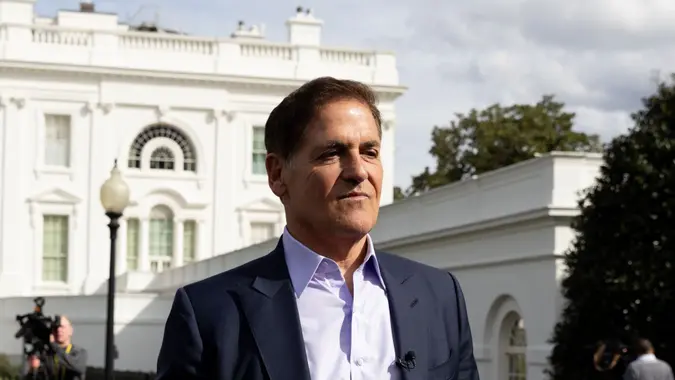Mark Cuban Recommends Going to a ‘Cheap’ College — 3 Reasons Why

Commitment to Our Readers
GOBankingRates' editorial team is committed to bringing you unbiased reviews and information. We use data-driven methodologies to evaluate financial products and services - our reviews and ratings are not influenced by advertisers. You can read more about our editorial guidelines and our products and services review methodology.

20 Years
Helping You Live Richer

Reviewed
by Experts

Trusted by
Millions of Readers
Going to college can make a dramatic difference in your career. For 25-34-year-olds, having a bachelor’s degree results in median earnings of $66,600 per year vs. $41,800 for those whose highest educational level is a high school diploma, according to the National Center for Education Statistics.
However, the high cost of college and the widespread availability of information online might prompt some to think that skipping higher education is a smart move. While that can pay off for some, it’s not necessarily the best route to take for everyone.
At the same time, you don’t necessarily have to spend a lot of money on college to succeed. Entrepreneur Mark Cuban, for example, once said he went to Indiana University because it had the lowest costs among the top 10 business schools.
Similarly, on the podcast Fishbowl with Jules Terpak, Cuban recently recommended that instead of taking a gap year, students should “go to a cheap school.”
Here are some of the top reasons for saving money where you can on your education.
You’re Saving Money While Still Investing in Your Future
The average cost of college comes out to $38,270 per year, according to the Education Data Initiative. That’s a lot of money to invest in your future, especially when you’re just figuring things out at around 18 years old. So, going to a cheap school can help you save money in comparison, while still making progress.
Instead, that first year or two of college, before you’re deep into your major, is essentially like a gap year, said Cuban on the podcast. You’re “learning how to learn,” and introducing yourself to new ideas and new people.
You Have More Flexibility
Going to a cheap school can be beneficial from a flexibility standpoint too, in the sense that if you don’t like the path you’re on, you can still make changes without ending up in a huge financial hole. As Cuban noted, even if you don’t complete a degree, taking a class in accounting or marketing is useful in the business world post-college.
To some extent, taking a gap year can make getting into college more challenging, unless you can prove that you used the gap year for something very positive. So, to some extent, taking a gap year is less flexible, whereas it could be reasonable to go to a cheap college for a bit, and if you find out later that you want to take time off, that could be an option.
You’re Moving in a Positive Direction
In addition to the more practical flexibility to make changes that you can gain by going to a cheap school, there can also be more mental freedom to move in the direction you want.
Regardless of what school you attend, what you major in, and what extracurriculars you take part in, the important thing is that you’re still learning and advancing yourself based on what you pick up in classes and from meeting new people. In contrast, opting out via something like a gap year doesn’t necessarily propel you forward the same way.
“Go towards something, not away from something,” said Cuban. “When you just put off things, it never gets better.”
 Written by
Written by  Edited by
Edited by 

























